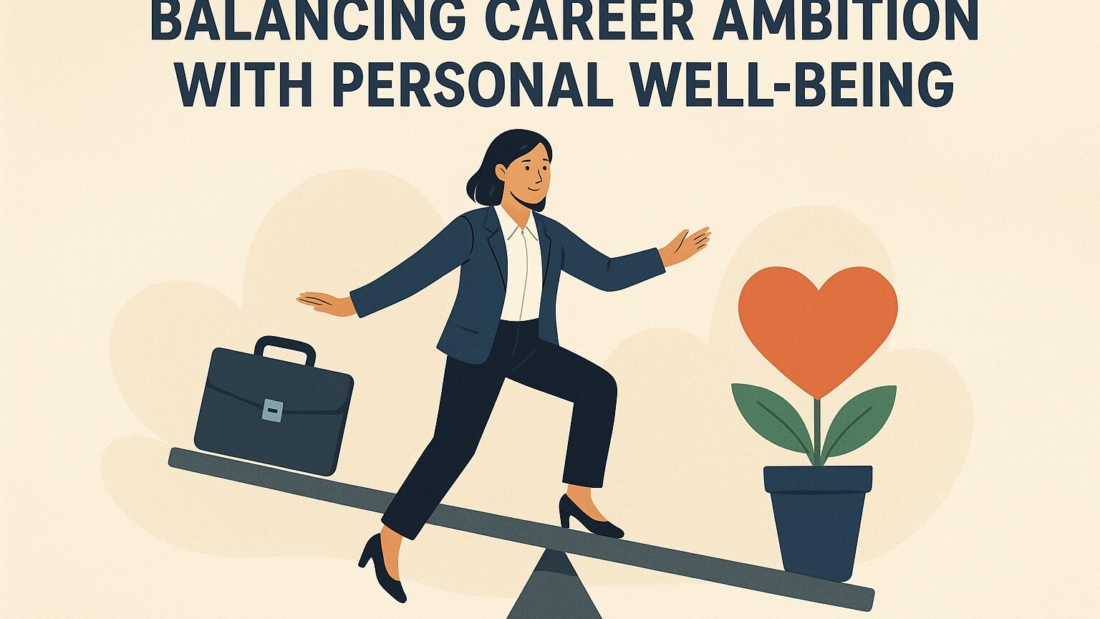In today’s fast-paced world, the pursuit of career success often dominates our lives. We live in a culture that glorifies hustle, late nights, and constant availability, where ambition is seen as the key driver of success. While ambition is essential for growth and achievement, it often comes at the cost of personal well-being. Burnout, stress, strained relationships, and declining health are common consequences of neglecting balance.
True success isn’t just about reaching the top of your career ladder—it’s about getting there in a way that keeps you physically, mentally, and emotionally well. Striking a balance between career ambition and personal well-being ensures long-term sustainability, happiness, and fulfillment.
Why Balance Matters
Career ambition is powerful—it fuels progress, drives innovation, and motivates us to aim higher. However, when ambition is unchecked, it can overshadow the very things that give life meaning. Without balance:
- Health suffers: Stress, lack of sleep, and poor nutrition weaken your body and mind.
- Relationships deteriorate: Friends and family may feel neglected, leading to isolation.
- Motivation declines: Overworking can lead to burnout, draining your drive to succeed.
On the other hand, when personal well-being is prioritized alongside ambition, professionals achieve greater resilience, creativity, and productivity. Balance is not about slowing down—it’s about moving forward smarter and more sustainably.
Strategies to Balance Career and Personal Life
1. Redefine Success
The traditional definition of success often revolves around titles, promotions, and financial rewards. While these are important, redefining success to include health, happiness, and relationships creates a more holistic vision. Ask yourself: Am I achieving this at the cost of my peace of mind? True success includes both professional milestones and personal satisfaction.
2. Set Boundaries
In the digital age, work is always within reach—emails, messages, and calls blur the line between personal and professional life. Setting clear boundaries is vital. For instance:
- Avoid checking emails after a certain hour.
- Use separate devices or apps for work and personal life.
- Communicate boundaries clearly to colleagues and clients.
Boundaries not only protect your time but also boost productivity during working hours.
3. Prioritize Well-Being as Non-Negotiable
Treat self-care as seriously as a business meeting. Schedule time for:
- Exercise: Movement reduces stress and boosts energy.
- Sleep: A well-rested mind performs better and makes smarter decisions.
- Nutrition: A healthy diet supports focus and endurance.
- Mental health: Meditation, journaling, or therapy can help process stress.
Making well-being non-negotiable ensures you don’t sacrifice health for short-term gains.
4. Practice Time Management
Time is your most valuable resource. To avoid overwhelm:
- Use productivity methods like the Pomodoro Technique or time-blocking.
- Identify your peak energy hours and reserve them for high-priority tasks.
- Delegate tasks that don’t require your direct attention.
This allows you to work efficiently without spilling into personal time.
5. Nurture Relationships
Strong personal connections serve as a buffer against work-related stress. Whether it’s family dinners, coffee with a friend, or a weekend getaway, relationships remind us of life beyond career goals. Making time for loved ones helps maintain emotional balance and resilience.
6. Learn to Say No
Ambitious professionals often fall into the trap of overcommitment. Saying “yes” to every project, meeting, or responsibility can spread you too thin. Learning to say “no” respectfully protects your priorities and prevents burnout. Remember, every “no” is a “yes” to something more meaningful.
7. Embrace Flexibility
Perfectionism and rigid expectations can hinder both ambition and well-being. Flexibility allows you to adapt without breaking. If work demands peak during certain months, balance it by carving out downtime later. Life doesn’t always follow a strict schedule—embrace adaptability to maintain harmony.
8. Seek Purpose, Not Just Position
Ambition rooted solely in status or financial rewards often leads to emptiness. Align your career goals with a deeper purpose—contributing to society, creating value, or pursuing passions. When your work feels meaningful, it energizes rather than exhausts you.
The Role of Employers and Organizations
Balancing ambition and well-being isn’t solely an individual responsibility—organizations also play a critical role. Employers who promote work-life balance benefit from happier, healthier, and more productive teams. Strategies companies can adopt include:
- Offering flexible work arrangements.
- Encouraging employees to take breaks and vacations.
- Providing wellness programs and mental health support.
- Recognizing achievements without glorifying overwork.
When organizations create a supportive culture, employees thrive professionally and personally.
Final Thoughts
Balancing career ambition with personal well-being is not a one-time achievement—it’s an ongoing practice. It requires self-awareness, discipline, and a willingness to prioritize what truly matters. By redefining success, setting boundaries, and taking care of health and relationships, professionals can pursue their ambitions without losing themselves in the process.
Remember, your career is a marathon, not a sprint. The goal is not just to succeed but to sustain that success while living a life filled with joy, health, and meaningful connections. Ambition should elevate your life, not overshadow it.

